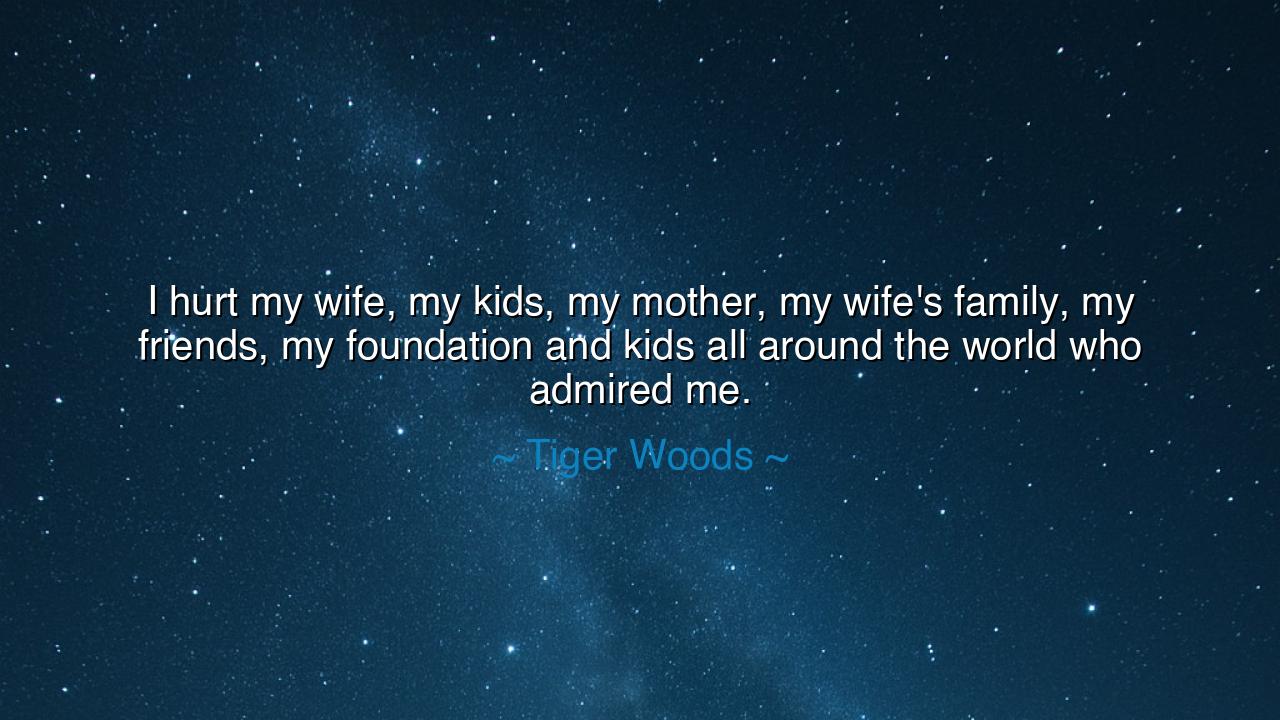
I hurt my wife, my kids, my mother, my wife's family, my friends
I hurt my wife, my kids, my mother, my wife's family, my friends, my foundation and kids all around the world who admired me.






Host: The rain fell in thin silver sheets, tapping against the wide windows of the quiet country club lounge. The hour was late — too late for laughter, too early for forgetting. The room smelled of wet grass, leather chairs, and the faint sting of spilled whiskey.
Jack sat at the bar, his hands wrapped around a glass he hadn’t touched in minutes. The television above him flickered — muted — playing an old highlight reel: Tiger Woods, young and fierce, fist-pumping on the 18th green. The caption read only one word: REDEMPTION.
Across the room, Jeeny entered — umbrella dripping, hair slightly undone by the storm. She saw him before he saw her. And in his posture, the way his shoulders slumped against the barlight, she recognized something raw — a man haunted by the shape of his own choices.
Jeeny: “You’re still watching the old tournaments?”
Jack: (without turning) “They don’t make them like that anymore. You can’t script glory. Or what comes after.”
Host: She sat beside him. The bartender nodded quietly and moved away. The rain continued its steady rhythm outside, like an old wound refusing to close.
Jeeny: “He once said — ‘I hurt my wife, my kids, my mother, my wife’s family, my friends, my foundation and kids all around the world who admired me.’ It wasn’t just a statement. It was a confession.”
Jack: “It was a performance. You think someone like him doesn’t have PR people feeding him every syllable?”
Jeeny: “Maybe. But I think that line came from somewhere real. You can’t fake the weight of shame.”
Host: The television flickered again — Tiger’s face, eyes downcast, microphone trembling slightly in his hand as he spoke those words to the world. The crowd of journalists leaned in, hungry for repentance.
Jack: “Shame doesn’t fix anything. Once you break trust, it’s over. You can rebuild your brand — not your soul.”
Jeeny: “That’s not true. He rebuilt both. Slowly, painfully. But he did.”
Jack: “He rebuilt his career, Jeeny. That’s different. People forgive talent. They don’t forgive betrayal.”
Jeeny: “Maybe because they confuse the two. We worship what people do, not who they are. That’s why his apology mattered. It showed the man under the myth.”
Host: The light from the bar caught the edge of Jack’s face, cutting a thin line across his cheek. His eyes stayed fixed on the screen, but his voice was quieter now.
Jack: “I used to think the same thing. Until I became the one apologizing.”
Jeeny: (softly) “Your wife?”
Jack: “Ex-wife now. I didn’t cheat. Not in the same way. But I was gone for years — working, chasing things that didn’t love me back. Turns out neglect wounds just as deep as betrayal.”
Host: A pause. The rain softened. The room seemed to lean in, listening.
Jeeny: “Then you understand him more than you think.”
Jack: “I understand weakness. Not redemption.”
Jeeny: “You don’t think redemption is real?”
Jack: “Not in the world we live in. We don’t forgive — we consume forgiveness. We want tears, speeches, a show of guilt. We don’t want healing; we want headlines.”
Host: Jeeny looked at him — long and steady. Her eyes were dark, reflective, like the storm outside.
Jeeny: “Maybe. But healing still happens — even if the world’s not watching. Tiger Woods didn’t need our forgiveness; he needed his own.”
Jack: “And you think he found it?”
Jeeny: “He fell apart, and then he walked back onto the same course that broke him. That takes more than ego. That takes courage. Maybe the point isn’t to fix what’s broken — maybe it’s to keep playing anyway.”
Host: Jack’s fingers traced the rim of his glass. The ice had melted — the drink was just water now. His reflection in the mirror behind the bar looked older, heavier, but not unrecognizable.
Jack: “You sound like you still believe in second chances.”
Jeeny: “I do. Because I’ve seen people who never got them.”
Jack: “You think failure builds character?”
Jeeny: “No. I think remorse does.”
Host: The bartender dimmed the lights further. The rain had eased to a whisper, soft enough to hear the clink of glass against wood.
Jack: “I don’t know, Jeeny. When someone destroys that much trust — their wife, their kids, the people who believed in them — what’s left to rebuild?”
Jeeny: “The truth. That’s what’s left. Not the perfect image — the human truth. That we’re capable of greatness and ruin. And both can exist in the same person.”
Jack: “That’s convenient.”
Jeeny: “No — that’s grace.”
Host: The word hung between them like incense — invisible but heavy.
Jeeny: “You remember when Tiger came back and won the Masters again? Everyone said it was impossible. Too old, too broken. But when he sank that last putt, he didn’t raise his arms like before. He just stood there — quiet, almost in disbelief. You could tell — he wasn’t celebrating victory; he was thanking survival.”
Jack: “And that makes up for everything he did?”
Jeeny: “No. Nothing makes up for it. But it means he didn’t waste the pain. That’s rare.”
Host: The television switched to a slow replay — Tiger embracing his son on the green, the circle complete, history folding back on itself. The image






AAdministratorAdministrator
Welcome, honored guests. Please leave a comment, we will respond soon